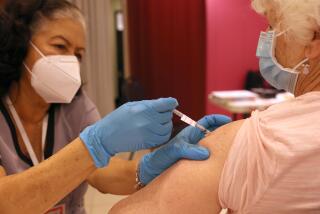Court to Rule on Hiding Sexual History
- Share via
The California Supreme Court, considering the case of a woman who said her former husband gave her HIV, appeared Tuesday to favor holding people responsible for failing to disclose previous, unprotected sexual contact with an infected partner.
During an hour of arguments in Los Angeles, several justices indicated there should be consequences for not informing a new sexual partner of possible exposure to AIDS. At the same time, the justices expressed qualms about invading the sexual privacy of people who might get dragged into litigation.
“Where do we draw the line?” Justice Kathryn Mickle Werdegar asked.
Under California law, a person can be held liable for monetary damages for failing to disclose that he or she has a sexually transmitted disease. At issue before the court is whether a person should also be responsible for informing a partner when they have reason to suspect they contracted a sexual disease but have not received a diagnosis.
A Los Angeles County woman identified by the court as Bridget B. sued her former husband for allegedly infecting her with HIV on their honeymoon. Bridget wants her ex-spouse, known as John B., to disclose the names of past male lovers and to produce his medical records. John contends she has no right to rummage through his sexual history.
A trial court judge ordered John to provide the information, but an appellate court ruled that the right of sexual privacy under state and federal constitutions limited the kind of information that could be requested during discovery, including the identity of past sexual partners.
Justice Marvin R. Baxter asked a lawyer for John whether someone who had unprotected sex with an HIV-infected partner should inform a new partner of that fact.
“That partner would then have the choice of whether to take that risk or not take that risk,” Baxter said.
Eric Multhaup, representing John, said a person should be liable for not disclosing a disease only if he or she has solid reason to suspect an infection, such as symptoms of the disease or a medical opinion.
A sexual encounter with an infected lover is not grounds for disclosure because transmission rates for HIV are relatively low, Multhaup said.
Justice Carol Corrigan seemed skeptical. A person who had unprotected sex with an infected partner stands a higher risk of getting and transmitting the disease, she noted.
“Isn’t your risk increased?” Corrigan asked.
Multhaup agreed it was increased but by a “marginal amount.”
Chief Justice Ronald M. George indicated he did not believe it a great burden to expect someone to warn a new sexual partner of exposure to a deadly disease.
“What’s the burden when we weigh it against the possible benefits?” George asked.
At the same time, George said the court has to be mindful of privacy rights.
Roland Wrinkle, a lawyer for Bridget, said court records can be sealed to protect the privacy of a defendant’s former lovers.
Following the hearing, Donald A. Garrard, a lawyer for John, said his client is a financial advisor in his early 40s. He said John and Bridget met at a conference on finance.
Garrard said his client is a heterosexual who tested negative for HIV when he applied for a life insurance policy after the couple was married. “She doesn’t have the right to rummage around in his personal history,” Garrard said.
In court papers, Bridget alleged that she was diagnosed with HIV six months after her marriage to John. She said he became sick and developed sores on his face and scalp the following year and admitted that he had sexual affairs with men before their marriage.
Jenny Pizer, senior counsel of Lambda Legal, a gay rights group, said she hoped the court would come up with a rule that applied to all sexually transmitted diseases, not just AIDS. She also said her group has strong concerns about protecting the privacy of third parties who could be pulled into a lawsuit.
“One of the very important issues ... is the extent to which litigants can do a fishing expedition,” Pizer said.
The court will decide the case, John B. vs. Superior Court, S128248, within 90 days.
More to Read
Get the L.A. Times Politics newsletter
Deeply reported insights into legislation, politics and policy from Sacramento, Washington and beyond. In your inbox twice per week.
You may occasionally receive promotional content from the Los Angeles Times.










